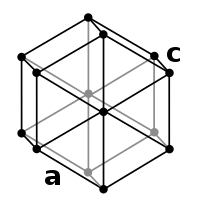
Photo from wikipedia
Abstract To ensure the energy efficiency of renewable hydrogen energy systems, power conservation and thermal management are necessary. This study applies these principals to the operation of metal hydride tanks… Click to show full abstract
Abstract To ensure the energy efficiency of renewable hydrogen energy systems, power conservation and thermal management are necessary. This study applies these principals to the operation of metal hydride tanks (MHTs) in a bench-scale hydrogen system, named Hydro Q-BiC™, comprising photovoltaic panels (20 kW), an electrolyzer (5 Nm3/h), MHTs containing a TiFe-based MH (40 Nm3), fuel cells (FC; 3.5 kW(power)/2.5 kW(heat)), and Li-ion batteries (20 kW/20 kWh). Here, we show that in a modified hydrogen production operation, with limited use of auxiliaries for cooling the MHTs, the power consumption of the MHTs was reduced by more than 99% compared to a typical operation. The thermal requirements for the MHTs were reduced by ceasing production in a pressurized state. During the hydrogen use operation, the power consumption was reduced to 1/4 and the FC heat output could be fully used; hence, the overall energy efficiency (power-to-hydrogen-to-power/heat) was as high as ~ 60% (43% for the typical operation).
Journal Title: International Journal of Hydrogen Energy
Year Published: 2020
Link to full text (if available)
Share on Social Media: Sign Up to like & get
recommendations!